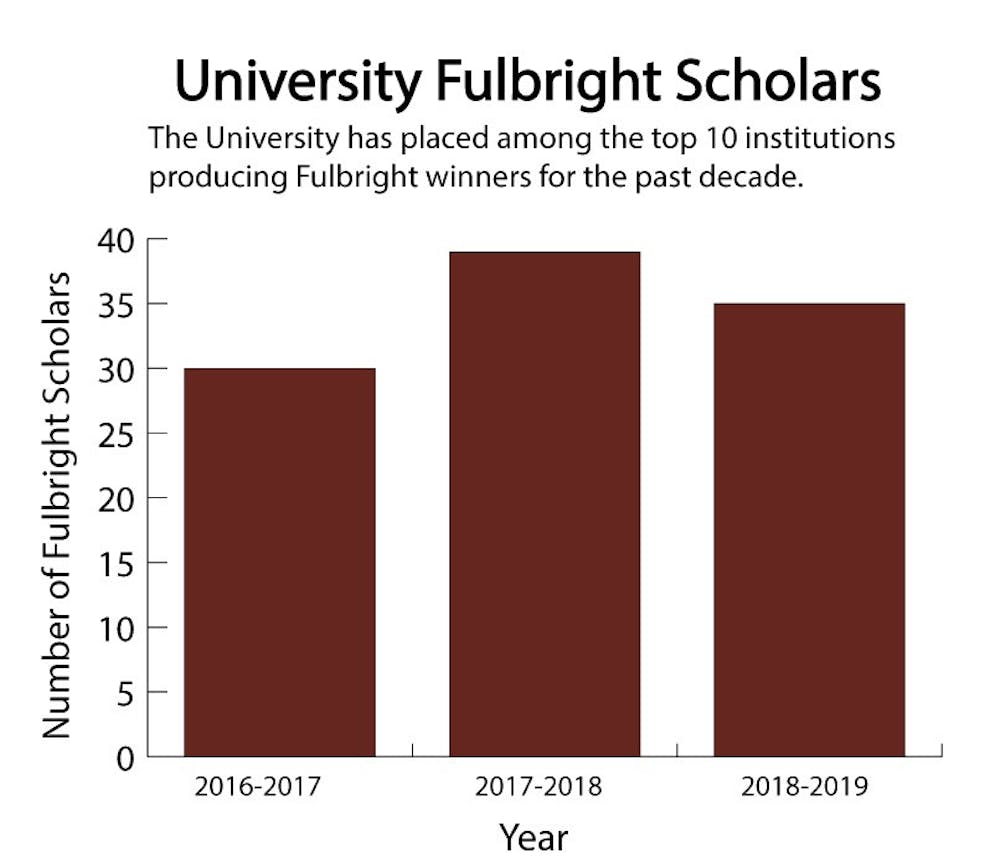With its 35-member spring 2018 cohort, the University produced the most Fulbright scholars of any U.S. institution for the third consecutive year, according to data published by The Chronicle of Higher Education Feb. 10.
Fulbright scholars receive funding to pursue independent research and English teaching assistantships in a variety of countries.
For the past decade, the University has placed among the top 10 institutions producing Fulbright winners, The Herald previously reported. While last year Brown produced 10 more Fulbright scholars than any other U.S. institutions, this year the University produced only two more Fulbright scholars than Princeton, according to The Chronicle of Higher Education’s data.
“The success that we’ve had encourages other students — they say nothing breeds success like success,” said Linda Dunleavy, the associate dean of the college for fellowships. . “A lot of Brown students are independent thinkers, independent learners and adventurers,” she added, and thus “the openness of the program lends itself to Brown students.”
Brown Fulbright scholars were quick to credit University support for the success of their applications. Timothy Jeng ’18, who is currently teaching English at the Universidad Camilo José Cela in Spain on a Fulbright English Teaching Assistant Award, said he appreciated the University’s encouragement during the application process.
“It’s something I wanted to achieve, and I think that I got through the initial block of ‘this is impossible,’ when I realized how much support there is from the University.”
Watufani Poe GS, a PhD student in Africana Studies at the University, received an Open Study/Research award through Fulbright that is “in line with my dissertation research, which looks at black, queer and trans socio-political movements in the United States and Brazil,” he said.“Brown students have a really easy time applying because of the robust support that the deans and professors offer.”
The Fulbright participants also noted how living abroad offers unique, educational opportunities, which enhances their experiences overall.
Jeng said he “found that settling into the discomfort (of being abroad) required realizing that things won’t always pan out the way you want; I learned I had to be flexible.”
Jeanelle Wheeler ’18, an English Teaching Assistant working in Lyon, France, said that her scholarship allowed her to “see a different cultural mentality.”
“I’m seeing myself and my Americanness in a new way,” she added.
Poe’s research experience has connected him to “a community of folks who are also here doing research. … It’s a cool program from that perspective, it doesn’t just throw you in the field alone.”
Ibtihal Elfaki ’18 is conducting research in Switzerland at the Courtine Lab, which focuses on spinal cord injuries. Using her Open Study/Research award, she is also collaborating with another Geneva lab to test a spinal LED implant, she said.
Elfaki advised future Fulbright applicants to “do their research into which countries they’ll be going to and make sure it’s a community they can be comfortable living in,” she said. “As a person of color and as a Muslim student, something that I was anxious about was living in a European country and being in an area with a history of Islamophobia and anti-black rhetoric.”
Though such considerations should not “be the deciding factor” for students, Elfaki said she “would want people to be aware.”
“The Fulbright is first and foremost a cultural exchange program, so the most important thing is an openness to other countries and other cultures,” Dunleavy said. Participants should be “learning from and learning with, rather than trying to bring something to those countries.”
The University has 65 semifinalists for this year’s Fulbright cohort, “which is the largest number we’ve ever had,” Dunleavy said. The application process is time-consuming, and “the students who win really work hard on the applications, and they’re really committed to it,” she added.





